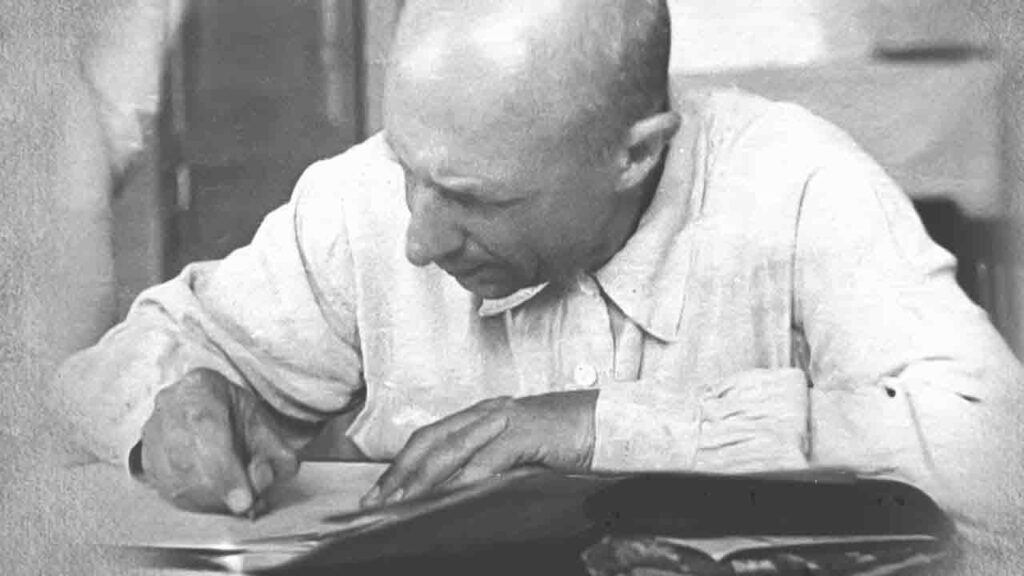Vsevolod Zaderatsky - Russian and Ukrainian Soviet composer, musician, writer, teacher. He lived a rich life, but by no means it can not be called cloudless.
The name of the composer has long been unknown to admirers of classical music. The name and creative legacy of Zaderatsky is intended to be wiped off the face of the earth. He became a prisoner of one of the toughest Stalinist camps - Sevvostlag. The musical works of the maestro miraculously survived and survived to this day.
On YouTube you will not find archival recordings of the musician's performances. During his lifetime, he managed only once to perform his own piece of music on the big stage. There was not even a poster, they just wrote the program of the concert on a piece of notebook paper.
Vsevolod Zaderatsky: childhood and youth
Maestro's date of birth is December 21, 1891. He was born on the territory of Rivne (then Rivne district, Volyn province, Russian Empire). During his lifetime, he managed to notify that his childhood passed happily. Parents managed to give Vsevolod an excellent upbringing, manners and education.
After some time, the family changed their place of residence. Zaderatsky met his childhood in the southern Russian city of Kursk. Since childhood, he was drawn to music. Parents took care of the education of their son. After receiving basic knowledge, he went to Moscow.
In the capital of Russia, Vsevolod became a student at the local conservatory. The young man studied composition, piano and conducting. It is also known that he received a second education. He entered Moscow University, choosing the Faculty of Law for himself.
The work of Vsevolod Zaderatsky as a music teacher
After some time, Vsevolod got a job as a music teacher in the royal family. It is also known that the composer taught music lessons for the heir to the throne Alexei, who at that time lived in St. Petersburg.
Vsevolod's son is sure that it was this episode in his father's life that became the decisive reason to destroy his father and, in fact, completely remove him from Soviet musical life.
In 1916 he was called to the front. Vsevolod did not want to fight, but he simply did not have the right to refuse. He took part in the First World War. After 4 years, he again had to take up arms. This time in the White Army in the Civil War. An end was put to his military career at the moment when he was captured by the Red Army. They wanted to shoot him twice - and they pardoned him twice. The government decided to exile Vsevolod to Ryazan.
This is not the first provincial town to which the maestro was exiled. He was deliberately cut off from Moscow, because they understood that in this city, however, as in St. Petersburg, cultural life is concentrated. Only a few years Zaderatsky managed to live in the capital of Russia. He was given the so-called "wolf passport", which did not give him the right to live in megacities.
Until the sunset of the 30s of the last century, he was in the status of "deprived". He did not have the right to vote, get a permanent job, visit some crowded places, make phone calls. Vsevolod's life is a threat, a deliberate removal from society, a struggle for one's rights, an encroachment on life, freedom, and the ability to create.

Arrest of Vsevolod Zaderatsky
When the Bolsheviks came to power, the musician remembered the support of the Whites. This crossed out the whole life of Zaderatsky, and for the NKVD he forever remained unreliable.
In the mid-20s of the last century, unknown people break into Vsevolod. They do not explain the reasons for coming, put on handcuffs and take him away. Zaderatsky was behind bars.
The maestro was crushed and destroyed. In this situation, it was not the arrest that bothered him, but the fact that his manuscripts were destroyed. All the works that Vsevolod wrote before 1926 could not be restored. The desperate and depressed composer makes an attempt to voluntarily die, but he is stopped in time. He was released only two years later. During this period of time, he composes piano sonatas that perfectly convey the gloomy and depressing mood of the composer.
Every day he lived like in a dream. In less than 10 years, Vsevolod again ended up in prison. Taught by bitter experience, he asked his wife to hide the work. He ended up in a prison in the city of Yaroslavl.
The search showed that Vsevolod's apartment was "clean". Only concert posters were found in his house. The program included works by Wagner and Richard Strauss. Later, the composer's wife found out that her husband was behind bars because of the "spread of fascist music." The woman was also told that her husband ended up in a labor camp "in the North." They could not correspond, since Vsevolod was banned from any contact with the outside world for 10 years. In 1939 he was released.
Vsevolod Zaderatsky: creativity in the Gulag
In places of deprivation of liberty, he composed an unsurpassed piece of music. In the Gulag he writes "24 Preludes and Fugues for Piano". This is a real masterpiece and one of the most famous musical compositions of the maestro. It perfectly combines baroque traditions and modern sound of music.
It will take only six months after his release - and the maestro again ended up in Yaroslavl. He submitted documents to GITIS. In an educational institution, he studied at the correspondence department. Then he visited several more Russian and Ukrainian cities, and only at the end of the 40s did he move to Lvov.
In the Ukrainian town, the composer really flourished. He found himself in a creative environment. Vsevolod entered the conservatory, which was the biggest reward for him. During this period of time, Zaderatsky tried to make musical compositions of his own composition performable. He wrote several piano concertos for children.
The thematic material for the creation of the second concert was the folk compositions of Ukraine, Russia and Belarus. The management rewarded Vsevolod with compliments regarding the work done. The written musical composition was supposed to sound at one of the concert venues in Kyiv.
However, even before the start of the concert, officials from Moscow visited Lviv. They were supposed to "expose" the province. Vsevolod with his "perfect" reputation - well suited for the role of the victim. His compositions were criticized, and the maestro himself was called mediocrity.
According to Vsevolod, he experienced a lot, but it was especially hard for him to hear that his work was mediocre. Experts expected gratitude from Zadertsky for supposedly rightly criticizing his work, but instead he began to fight for his own reputation.
He wrote angry letters to the head of Soviet Music and the director of the Muzfond. Vsevolod was very risky, because at that time, any careless word cost a person his life.
Vsevolod Zaderatsky did not stop flooding the leadership with letters. He thought he had nothing to lose. However, the man was wrong. In this obviously losing dispute, he lost his health. Vsevolod began to worry about the pain in his heart. He felt downright ill.
Musical legacy of the composer
The works that the maestro composed before his first arrest could not be restored. After his release, he did not try to restore what he had written from memory. Biographers only managed to find out that before his arrest, he worked on a big opera based on the story of the writer Gogol - "The Nose".
Vsevolod's work can be divided into several stages. The first stage is the works that included works before 1926. Almost immediately after his release, he took up writing piano sonatas No. 1 and No. 2. The presented works open the second stage of Zaderatsky's creative life. The second stage continued until the 32nd year of the last century. During this time he composed several piano cycles and songs for voice and piano.
After 1932, a new stage in the maestro's work opens. He turned to neotonal musical thinking. During this period of time, he wrote the most famous work - "24 Preludes and Fugues". At the end of the 40s, his musical piggy bank included a lot of musical compositions for piano, a chamber symphony, and vocal works.
Then he had to work hard to change the musical language. His work is dominated by the sound of folk compositions. He composes a couple of piano concertos for children, one symphony and a violin concerto.
Death of Vsevolod Zaderatsky
The last years of the maestro's life were spent on the territory of Lviv. Vsevolod until the end of his life was listed as a teacher at the conservatory. The creative path of the composer ended with the creation of the Concerto for Violin and Orchestra.
He died on February 1, 1953. A year later, his Symphony No. 1 and the Violin Concerto were performed in Lvov. After that, most of his works were forgotten, and only in the new century did society begin to be interested in the work of the great maestro.
Those who want to get acquainted with the biography of the great composer in more detail, we advise you to watch the film "I am free." The biopic was released in 2019.
In May 2021, the premiere of the composer's vocal cycle took place in Samara. We are talking about the work "Poem about a Russian soldier" on the verses of the poet Alexander Tvardovsky. In the same year, the opera The Widow of Valencia was presented on stage in an orchestral version by the composer Leonid Hoffmann.



